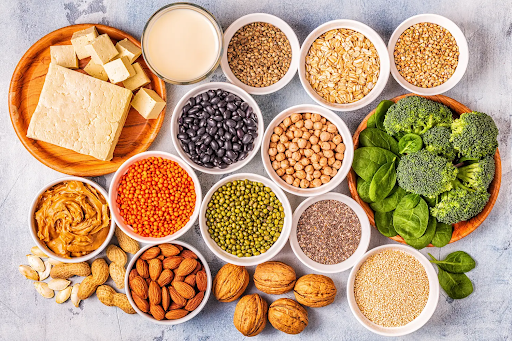7 Flavor-Packed BBQ Sauces That Are Perfect for Meatless Grilling
7 Flavor-Packed BBQ Sauces That Are Perfect for Meatless Grilling
Blog Article
All Concerning Healthy Food: Advantages of Taking On Plant Based Alternatives
The conversation surrounding plant-based diet plans has gotten substantial focus in recent times. Numerous individuals are checking out the possible health benefits, nutritional advantages, and ecological effects connected with these nutritional choices. As individuals end up being much more familiar with their food's impact on health and sustainability, concerns occur regarding the functionalities of embracing such a way of life. What certain modifications can one expect, and exactly how might these options improve not just personal health however also the earth's future?
Comprehending Plant-Based Diets
Although many individuals associate plant-based diets generally with vegetarianism or veganism, these diet regimens can incorporate a large range of consuming patterns that prioritize entire, minimally refined plant foods. Such diet regimens often consist of fruits, vegetables, entire grains, seeds, legumes, and nuts, while getting rid of or limiting animal products. This versatility permits people to tailor their dietary selections according to dietary needs and individual preferences. Some may adopt a primarily plant-based diet while still sometimes consuming meat or milk, often referred to as a flexitarian approach. The focus stays on integrating even more plant foods, which can bring about a varied range of dishes and tastes. Recognizing these various interpretations of plant-based eating is vital for appreciating its accessibility and charm in modern food culture.
Wellness Advantages of Plant-Based Foods
The wellness advantages of plant-based foods are considerable, using a nutrient thickness advantage that sustains general well-being. Study indicates that these foods can enhance heart health and wellness and play a vital role in effective weight management. By integrating extra plant-based choices, individuals might improve their dietary choices and promote lasting wellness.
Nutrient Thickness Advantage
Nutrient density plays a crucial duty in the health and wellness advantages of plant-based foods, making them a compelling selection for those looking for a balanced diet regimen. Plant-based foods, such as fruits, vegetables, beans, nuts, and whole grains, are typically rich in crucial vitamins, minerals, and antioxidants while being lower in calories. This high nutrient density enables people to take in fewer calories while still satisfying their dietary demands. In addition, these foods are packed with nutritional fiber, promoting digestive system health and helping in weight management. By integrating nutrient-dense plant-based choices, consumers can improve their general wellness, sustain their immune systems, and lower the risk of persistent conditions. Inevitably, the nutrient density of plant-based foods emphasizes their relevance in a health-conscious way of living.
Heart Health Renovation

Weight Management Assistance
Along with advertising heart health, a plant-based diet can significantly assist in weight management. This nutritional method emphasizes whole foods such as fruits, veggies, beans, nuts, and whole grains, which are normally lower in calories and greater in fiber compared to animal-based items. The high fiber content assists enhance satiation, reducing general calorie intake. Plant-based diet regimens are frequently abundant in vital nutrients while low in undesirable fats, making it easier to keep a healthy weight. Research shows that people that adopt a plant-based way of life tend to have reduced body mass indexes (BMIs) and experience even more successful fat burning compared to those that eat meat-heavy diets. Subsequently, embracing plant-based choices is a calculated choice for effective weight monitoring
Nutritional Worth of Plant-Based Components
Plant-based ingredients are rich in vital nutrients, using a varied array of vitamins, minerals, and anti-oxidants that add to overall health and wellness. A contrast of healthy protein sources exposes that while pet items are commonly considered as superior, numerous plant-based choices offer adequate healthy protein and other useful compounds. Comprehending the dietary value of these active ingredients can help people make educated nutritional options.
Necessary Nutrients in Plants
Nutrient-rich components found in plants provide a varied selection of vital vitamins and minerals that add substantially to general health. These active ingredients are abundant in vitamins A, C, and K, which sustain immune function, vision, and blood clotting, specifically. Additionally, plants supply vital minerals such as potassium, calcium, and magnesium, critical for heart health, muscular tissue function, and bone toughness. The existence of fiber in plant-based foods help digestion and advertises a healthy digestive tract microbiome. Antioxidants, located abundantly in veggies and fruits, aid battle oxidative stress and reduce swelling. Several plant foods are reduced in calories yet high in nutrients, making them an excellent option for those seeking to maintain a healthy and balanced weight while guaranteeing perfect nutrient consumption.

Contrasting Protein Resources
Healthy protein resources vary considerably in their nutritional profiles, with plant-based components using unique advantages. Unlike animal healthy proteins, which often contain hydrogenated fats and cholesterol, plant proteins have a tendency to be lower in these harmful components. Legumes, nuts, seeds, and entire grains are abundant in necessary amino acids, fiber, vitamins, and minerals. Lentils supply high healthy protein content together with significant iron and folate, while quinoa is a Gluten Free BBQ Sauce total protein, supplying all 9 necessary amino acids. Furthermore, plant-based proteins are typically accompanied by antioxidants and phytochemicals that sustain total health and wellness. The change to plant-based healthy protein sources not just boosts nutritional consumption yet also straightens with sustainable nutritional methods, decreasing ecological impact and promoting lasting health advantages.
Environmental Effect of Plant-Based Eating
As understanding of climate change grows, numerous people are checking out lasting nutritional choices that can considerably reduce their environmental footprint. Plant-based eating has emerged as a significant contributor to reducing greenhouse gas exhausts, which are largely linked with animals production. The farming of fruits, grains, beans, and vegetables generally calls for fewer resources, such as water and land, contrasted to animal farming. In addition, plant-based diets can cause lowered logging, as less land is needed for grazing livestock or expanding animal feed. By moving in the direction of plant-based choices, consumers can support biodiversity and advertise healthier communities. In general, accepting plant-based consuming not only advantages individual wellness but also stands for an important step towards environmental sustainability and preservation efforts.
Conquering Common Misconceptions
While many people recognize the benefits of a plant-based diet, a number of misconceptions often hinder them from completely welcoming this way of life. A typical idea is that plant-based diets lack adequate healthy protein; nevertheless, numerous plant sources, such as beans, nuts, and tofu, give ample protein. Furthermore, some assume that this diet plan is pricey, when in truth, staples like beans, rice, and seasonal vegetables can be rather affordable. Another false impression is that plant-based consuming is extremely restrictive, whereas it really uses a diverse array of foods and flavors. Several worry that a plant-based diet might lead to shortages, yet with appropriate preparation, individuals can get all required nutrients, consisting of vitamins and minerals, while enjoying a large variety of delicious dishes. Vast Tips for Transitioning to a Plant-Based Lifestyle
Making the shift to a plant-based way of life can be an improving experience, though it frequently requires some support to browse the first changes. Initially, individuals are motivated to start slowly, including even more fruits, veggies, vegetables, and entire grains right into their meals while decreasing meat and milk intake. Dish preparation is necessary; preparing a regular food selection can aid ease the adjustment and protect against last-minute undesirable selections. Discovering brand-new recipes and cooking techniques can additionally preserve and improve the experience enjoyment about plant-based eating. In addition, joining support teams or neighborhoods can offer motivation and share important ideas. Staying notified about nourishment warranties balanced dishes, protecting against deficiencies while cultivating a healthy and balanced, gratifying plant-based way of living.

Delicious Plant-Based Dish Concepts
Exploring tasty plant-based dish concepts can motivate individuals to welcome an extra healthy diet plan. One popular alternative is a passionate quinoa salad, including cherry tomatoes, cucumber, and a spicy lemon-tahini dressing. An additional favorite is a tasty lentil stew, loaded with carrots, celery, and aromatic natural herbs, excellent for a calming dinner. For breakfast, over night oats made with almond milk, chia seeds, and topped with fresh berries offer a nutritious begin to the day. Furthermore, a lively veggie stir-fry with tofu and a range of vivid veggies can be a quick yet satisfying dish. Lastly, creamy avocado toast on whole-grain bread, sprayed with seasonings and seeds, offers an easy yet tasty snack. These meals showcase the selection and richness of plant-based eating.

Frequently Asked Questions
Can a Plant-Based Diet Regimen Provide Sufficient Healthy Protein?
The inquiry of whether a plant-based diet plan can give enough healthy protein is usual. Various sources, consisting of legumes, nuts, seeds, and entire grains, can satisfy protein needs properly, sustaining a healthy and well balanced diet regimen for individuals.
Are Plant-Based Diets Appropriate for Kid?
The suitability of plant-based diet plans for children depends upon cautious preparation. Appropriate nutrients should be guaranteed, including vitamins, minerals, and healthy proteins. With proper support, such diets can sustain healthy and balanced development and development in children.
How Do I Eat Out on a Plant-Based Diet plan?
Eating out on a plant-based diet entails looking for restaurants with varied food selections, asking for modifications, and checking out vegan-friendly options. Planning ahead and communicating nutritional preferences can improve the eating experience while keeping dietary options.
What Are Typical Irritants in Plant-Based Foods?
Common irritants in plant-based foods consist of soy, gluten, nuts, and seeds - Plant Based Chicken. Individuals adhering to a plant-based diet needs to understand these irritants and review labels very carefully to stay clear of adverse responses and ensure secure intake
Can Plant-Based Diets Aid With Weight-loss?
Study suggests that adopting a plant-based diet regimen may assist in fat burning due to its usually reduced calorie thickness and higher fiber web content. This mix can enhance satiation, helping people manage their caloric intake efficiently. Numerous individuals connect plant-based diet plans primarily with vegetarianism or veganism, these diets can include a broad range of consuming patterns that prioritize whole, minimally refined plant foods. Nutrient thickness plays an essential role in the health benefits of plant-based foods, making them a compelling selection for those seeking a well balanced diet. Plant-based diet regimens have actually been shown to markedly boost heart health, as they frequently include elements that support cardiovascular function. In enhancement to promoting heart wellness, a plant-based diet regimen can significantly help in weight monitoring. A common idea is that plant-based diet plans do not have sufficient healthy protein; nonetheless, many plant resources, such as legumes, nuts, and tofu, offer ample protein.
Report this page